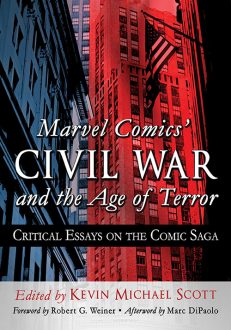Marvel Comics’ Civil War and the Age of Terror
Critical Essays on the Comic Saga
$29.95
In stock
About the Book
Marvel Comics has an established tradition of addressing relevant real-life issues facing the American public. With the publication of Civil War (2006–2007), a seven-issue crossover storyline spanning the Marvel universe, they focused on contemporary anxieties such as terrorism and threats to privacy and other civil liberties. This collection of new essays explores the Civil War series and its many tie-in titles from the perspectives of history, political science, sociology, psychology, literary criticism, philosophy, law and education. The contributors provide a close reading of the series’ main theme—the appropriate balance between freedom and security—and discuss how that balance affects citizenship, race, gender and identity construction in 21st-century America.
About the Author(s)
Bibliographic Details
Edited by Kevin Michael Scott
Format: softcover (7 x 10)
Pages: 240
Bibliographic Info: notes, bibliography, index
Copyright Date: 2015
pISBN: 978-0-7864-9689-1
eISBN: 978-1-4766-2218-7
Imprint: McFarland
Table of Contents
Acknowledgments vi
Key to Abbreviations xi
Foreword (Robert G. Weiner) 1
Introduction (Kevin Michael Scott) 3
Part I —The SHRA: What the Marvel Universe Tells Us About American Legal Culture
The Superhuman Registration Act, the Constitution, and the Patient Protection and Affordable Care Act (Ryan M. Davidson) 11
Whose Side Is the Law On? Living with Legalistic Absurdity in Marvel’s Civil War (Daniel Davis Wood) 26
Part II —Superheroics and the American Response to 9/11
Marvel’s Illuminati: Who Watches the Watchmen? (Mark Bousquet) 37
“You wish to know of war, old man?” Generational Conflict, Moral Compromise and Youth Rebellion in Civil War: Young Avengers & Runaways (David Sweeney) 48
Whither Alpha Flight? The Nationalistic Response to Canada During the War on Terror (Brenna Clarke Gray) 58
Freedom versus Security: The Basic Human Dilemma from 9/11 to Marvel’s Civil War (Travis Langley) 69
Part III —Political Philosophy and Civil War
Political (In)Visibility in the Marvel Universe and the Real World (Anthony Petros Spanakos) 77
The Language of Common Sense: Thomas Paine and Civil War (Scott Cleary) 90
Competing Authorities in the Nation State of Marvel (Karl E. Martin) 98
Iron Curtain Man versus Captain American Exceptionalism: World War II and Cold War Nostalgia in the Age of Terror (Kathleen McClancy) 108
Part IV —Super-Powered, American and Marginalized: Triple Consciousness in the Marvel Universe
Battles of Family, Freedom and Femininity: Portrayals of Gender in Marvel’s Civil War (Brandi Hodo) 121
Superdad: Luke Cage and the Heroic Fatherhood Ideal in the Contemporary Marvel Universe (Jeffrey A. Brown) 130
Part V —Character(s) Revealed Through Trauma
Between Two Towers: The Struggle for the Soul of Spider-Man (Daniel J. O’Rourke) 143
Captain America in the 21st Century: The Battle for the Ideology of the American Dream (John McGuire) 150
Part VI —Graphic Narrative and Cultural Resonance
Visual Form and Meaning Making in Marvel’s Civil War (Joseph J. Darowski) 165
When Flaw Meets Form Meets Function: Narratology, Crossover Comic Events and a New Art Experience (Kevin Michael Scott) 174
Part VII —Teaching the Trouble: Pedagogy and Civil War
Teaching Ethics When Hero Battles Hero (Mark D. White) 189
Illustrating Pedagogy of the Oppressed: A Freirian Approach to Teaching Marvel’s Civil War (Seneca Vaught) 200
Afterword: Why Civil War Matters, Why This Book Matters (Marc DiPaolo) 213
About the Contributors 221
Index 223





